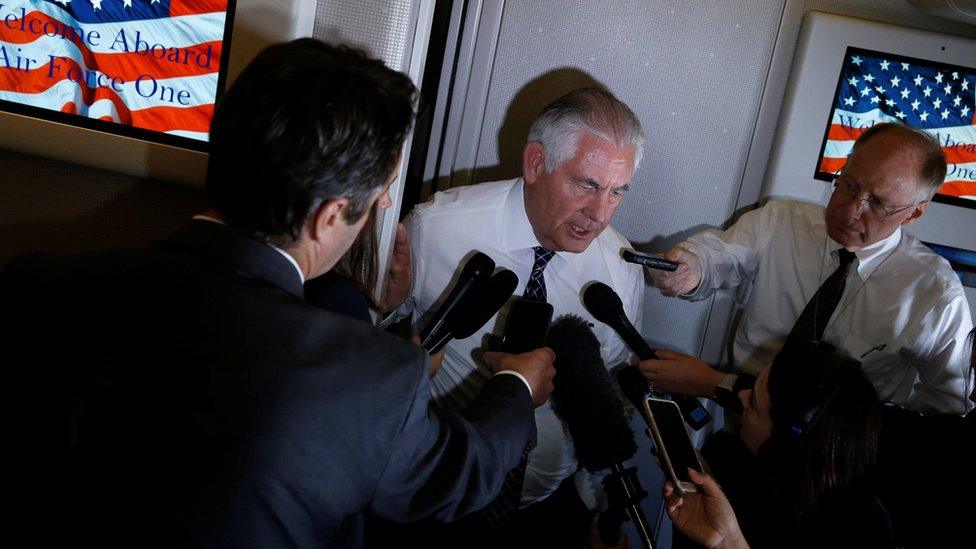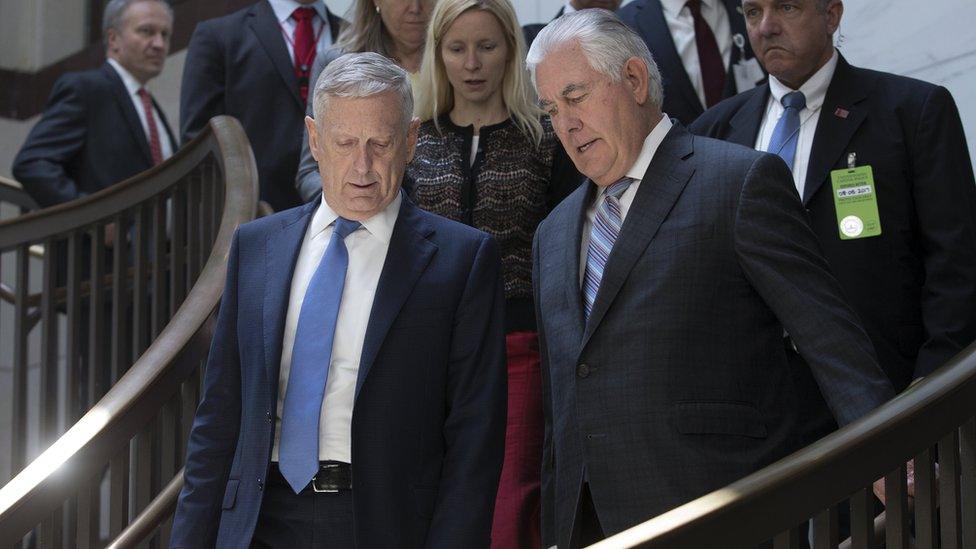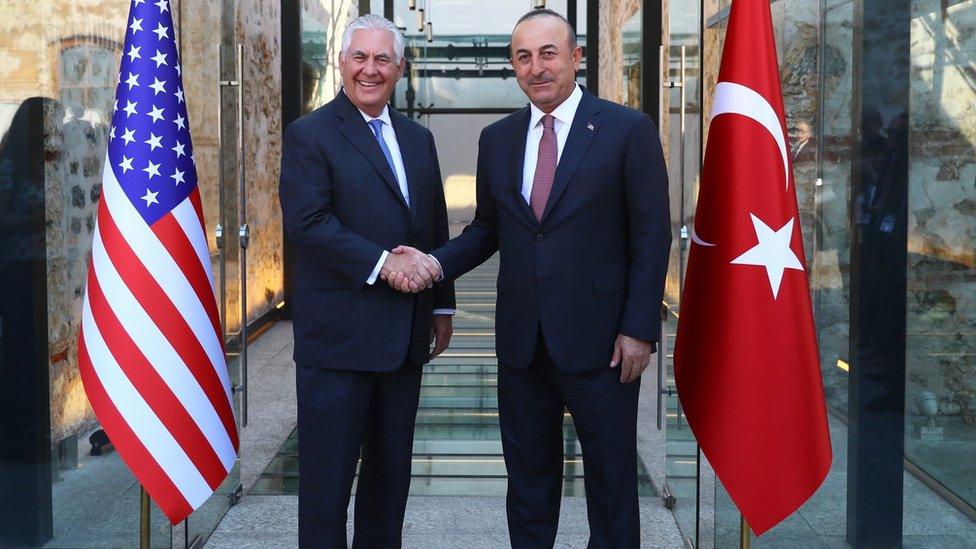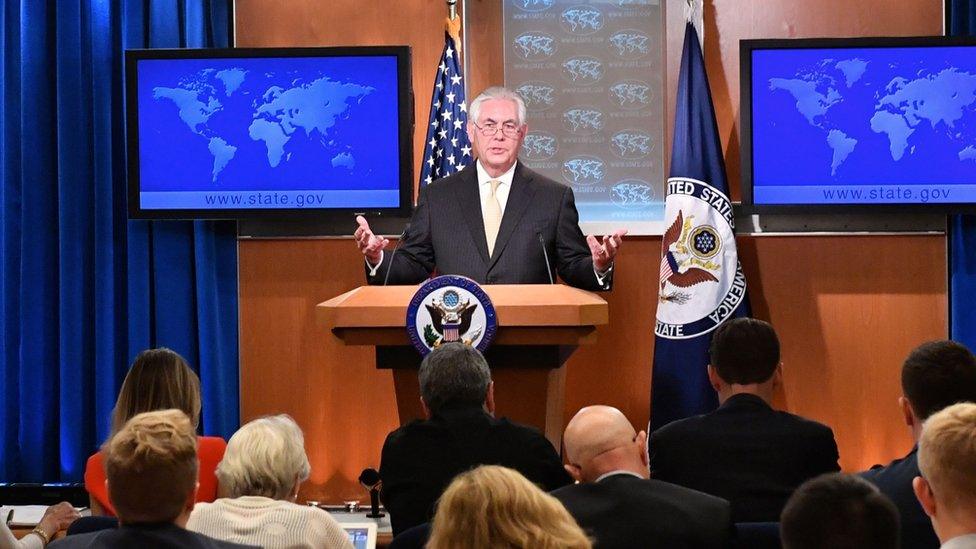Trumplomacy: Is Tillerson getting ready for a Rexit?
- Published

Tillerson speaks to reporters in May
As the Trump administration careened past its first six months in office the swirl of speculation about an imminent "Rexit" prompted the Secretary of State to publicly deny that he was about to quit.
Personally I don't think he is a quitter, but it's been a rough ride for both Rex Tillerson and the State Department.
Every transition between administrations has a bumpy period of adjustment amidst tussles over who's controlling policy. The difference this time is the fear that the State Department's becoming irrelevant.
And it's common when secretaries of state first enter the job for career officers to complain that new bosses are aloof and their staff insular.
The difference this time is that the former Exxon chief executive actually sold himself well on the shop floor: he was welcomed on day one as the acceptable face of the Trump administration by employees who wanted him to succeed.
But many have since grown disillusioned and demoralised.
The environment is "toxic", says Nancy McEldowney, the director of the Foreign Service Institute, who retired early last month because "the situation had become untenable".
This week the secretary publicly defended himself in front of the State Department press corps. It was a decent performance.
However, in the minds of people who care about US foreign policy, it was way overdue. He declared that his busy schedule responding to the world's conflicts and threats demonstrated the building was "hardly hollowed out".
But it is definitely much quieter than usual as Tillerson navigates the steep learning curve from corporate executive to top diplomat in a chaotic political climate.
Not the top boss
He is accustomed to a highly structured, disciplined environment where the buck stops with him. "I was the ultimate decision maker (at Exxon)," he said recently, "that always makes life easier."
But that is never the case in government, and particularly not in this one.

US Secretary of Defense James Mattis and US Secretary of State Rex Tillerson walk to the Senate Foreign Relations Committee closed briefing
President Trump has delegated key foreign policy portfolios to close White House aides. His erratic tweets and statements have at times contradicted and apparently undermined the secretary, reinforcing the impression that Tillerson is not in control of his brief.
One of his senior advisers, RC Hammond, told me the president's tweeting can create new levers of diplomatic pressure. But Tillerson himself has likened it to one of the many unexpected elements of his universe to which he adapts.
"It's just like dealing with dynamic situations in my old CEO role," he's said. "You try to accommodate what's changing and still move."
This has not, it seems, affected his "comfortable" and "open" relationship with the president, who calls him any time of the day, night or weekend.
Tillerson says they speak candidly about their differences, but the secretary's voice is one among many. He failed to persuade the president to stay in the Paris Climate Accord, and will struggle to convince him to stick with the Iran nuclear agreement, external.
Human resources crisis
When it comes to the State Department, Tillerson's been saddled with a proposed budget cut so draconian that even Congress isn't taking it seriously, from an administration that has demonstrated it values the military over diplomacy.
This, combined with an Executive Order demanding a streamlining of government agencies, external, has created a climate of insecurity and low morale.
"If you have the wheels cut out from under you, and you're competing with a shadow State Department in the White House, it's hard to come into the office in the morning," one official here told me.
The result is a crisis in human resources that's damaging the department's ability to do its job.
Most of the top positions crucial for shaping America's engagement with the world remain unfilled. The slow pace of senior political appointments is a problem across the administration that has deeply frustrated Tillerson, external, who's admitted that he has "a lot of open slots".
At the lower level hiring is largely on hold due to the pending budget cuts and department reorganisation. Tillerson has maintained an indefinite hiring freeze, he's suspended prestigious fellowship programmes that recruit top talent, external and stopped job transfers between bureaux, external.
There's also been an exodus of career officers who've served for decades, some of them abruptly dismissed from their assignments with very short notice.
"That's a mistake," says Daniel Fried, a veteran ambassador who retired in February. "Once you start throwing away people, that's the basic capital, you can't replace them."

McEldowney says many of her colleagues were devastated by Tillerson's take on "America First": he interpreted it as separating the country's interests from its values.
His political aides, she says, don't trust career officers who are asking how budget cuts and staff reductions will affect US policy.
This contributes to a centralised and isolated decision making process that is slowing down work. And the secretary, she says, has failed to establish effective lines of dialogue with much of the building.
"Normally after a transition the concepts of us and them blur and give way to a genuine team," says McEldowney.
"People are beseeching Tillerson and team to trust and empower the career people and it's falling largely on deaf ears. We were told to get with the programme and quit grousing."
Reorganisation limbo
All of which leaves people wondering whether the reorganisation will be a merger that eventually does create a genuine team, or a hostile takeover.
Tillerson believes it's the former. He says he's consulting from the ground up and letting the employees lead the effort to redesign the department. And in the end, he vows, whether it takes changes in law or resource allocation, "I'll darn sure go to bat for you and see what we can do."
About half of the department's 75,000 staff members took part in an initial survey. They offered suggestions for a tune-up such as improving poor technology and eliminating overlapping or redundant functions.
But the corporate buzzwords used by the outside consultants conducting the exercise reinforced concerns that Tillerson and company were bringing in bean counters to assess something difficult to quantify. Unlike the economy or the military, it's difficult to apply metrics to foreign policy, to always show a concrete return on investment.
"People question if [the Trump administration and Tillerson's leadership] understand the role the Department of State plays in forwarding the interests of the United States in the world," one report says, external.
Given the timeline, these doubts could grow: the project is expected to run well into 2018. In the business world any new boss who wants to carry out radical change is advised to do so quickly. Drawing out the process fuels leaks and rumours, external and stokes uncertainties. People with better prospects drift away.
The danger in that scenario is a slow unravelling rather than a dramatic gutting of the institution.
Public relations
In such circumstances, clear communication is crucial. Whatever the reality, the perception is of a State Department adrift, which means the secretary's message is not echoing through the department, never mind the world outside.
To some degree that may reflect a lack of coherence in the administration as a whole, but Tillerson and his team could do a better job of selling the man and his mission, says Fried.

"You've got to work to have people internalise your vision, that's how you lead."
The addition of a spokesperson is a step in the right direction. Tillerson has also evolved from an initial aversion to media and begun holding news conferences, showing himself to be comfortable and adept at doing so.
This week he gave a round-up of his hands-on, shoe-leather diplomacy aimed at trying to tighten the isolation of North Korea, salvage a relationship with Russia, ease the Qatar crisis, and inject greater US input into shaping a solution to the Ukraine conflict - Fried has called his personnel appointments on this last issue "A-grade".
Tillerson also made a point of demonstrating that he is relying on expertise in the building, calling out by name a list of career diplomats who've been working closely with him on these issues. But in effect he told employees who are unhappy with the transition to get with the programme and quit complaining, suggesting the problem was that they were unwilling to carry out the policies of the Trump administration.
The secretary of state is hopeful there will be an uptick in morale as the redesign moves forward.
We shall see.
I'm guessing he'll hang on at least until that's done.